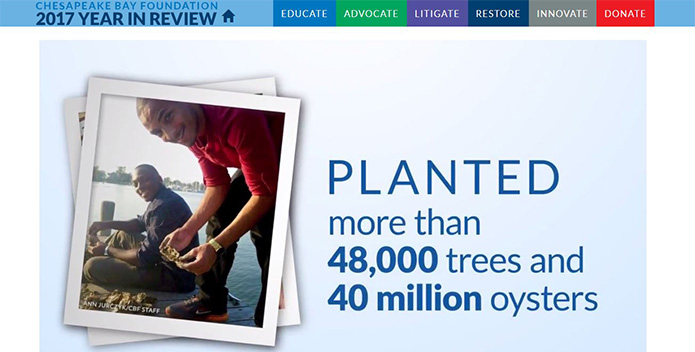2017 was a year of milestones. Celebrating our 50th year of working to save the Bay, with incredible support from our members, CBF accomplished an awful lot. Some highlights include:
- 48,000+ trees in the ground
- 30,000+ adults and students outside connecting with our Bay and rivers through our pioneering outdoor environmental education program
- 40,000,000+ water-filtering oysters planted on sanctuary reefs throughout the Bay
Thanks to the amazing efforts from individuals, governments, and businesses working together to reduce pollution, the Bay and its rivers and streams are beginning to heal. Recently, the Chesapeake Bay Program announced water quality reached a near-record high, with underwater grasses booming, oyster populations rebounding, and dead zones shrinking.
But as we celebrate this progress, we are more aware than ever of the dangers facing the Bay. While the proposed Trump administration budget zeroes out federal funding for Chesapeake Bay restoration and EPA Administrator Scott Pruitt continues to erode federal environmental protections for air and water, we are undeterred. Together we will continue to fight even harder for healthy, resilient waters that are critical to our health, economy, and way of life.
This Week in the Watershed: Growing Grasses, Conowingo Cost, and Poop Power
- A Baltimore scrapyard is paying a penalty for failing to monitor polluted runoff, which often includes toxic contaminants from industrial sites. (Bay Journal)
- Calling all volunteers! CBF is looking for Virginians interested in growing underwater grasses. In the spring, volunteers will plant their grasses in nearby sites. (Alt Daily—VA) BONUS: CBF Press Release
- Exelon needs to pay for its share of damage from the Conowingo Dam, writes CBF's Tom Zolper. (Chestertown Spy—MD)
- A report from the Chesapeake Bay Program reveals that Bay water quality is improving, but there is still room for improvement. (Daily Press—VA) BONUS: CBF Press Statement
- A Virginia farmer is using the manure from his farm animals in a unique way. (Bay Journal)
What's Happening Around the Watershed?
January 4
- Easton, MD: Come hear state legislators and numerous regional organizations discuss their preservation, land and water goals for the 2018 Maryland General Assembly's Regular Legislative Session. Click here to register!
January 10
- Annapolis, MD and Richmond, VA: Legislative session starts in both Maryland and Virginia—stay tuned for how you can take action for clean water in the Bay and your local rivers and streams!
January 21
- Easton, MD: Join us for a delightful afternoon enjoying oysters and wine. Hear from wine connoisseurs and representatives from three Eastern Shore aquaculture farms: Orchard Point Oysters, Madhouse Oysters, and Hoopers Island Oyster Company. There will also be oyster policy experts and scientists on hand to provide information and answer questions. Click here to register!
January 25-February 3
- Throughout Virginia: Help restore the health of the Chesapeake Bay and Virginia's rivers by participating in CBF's Grasses for the Masses program. Participants grow wild celery, a type of underwater grass, in their homes for 10-12 weeks. After 10-12 weeks of grow-out, participants will gather to plant their grasses in select local rivers to bolster grass populations and help restore the Bay. With workshops held throughout Virginia, there's plenty of opportunity to get involved. Click here to find one near you!




